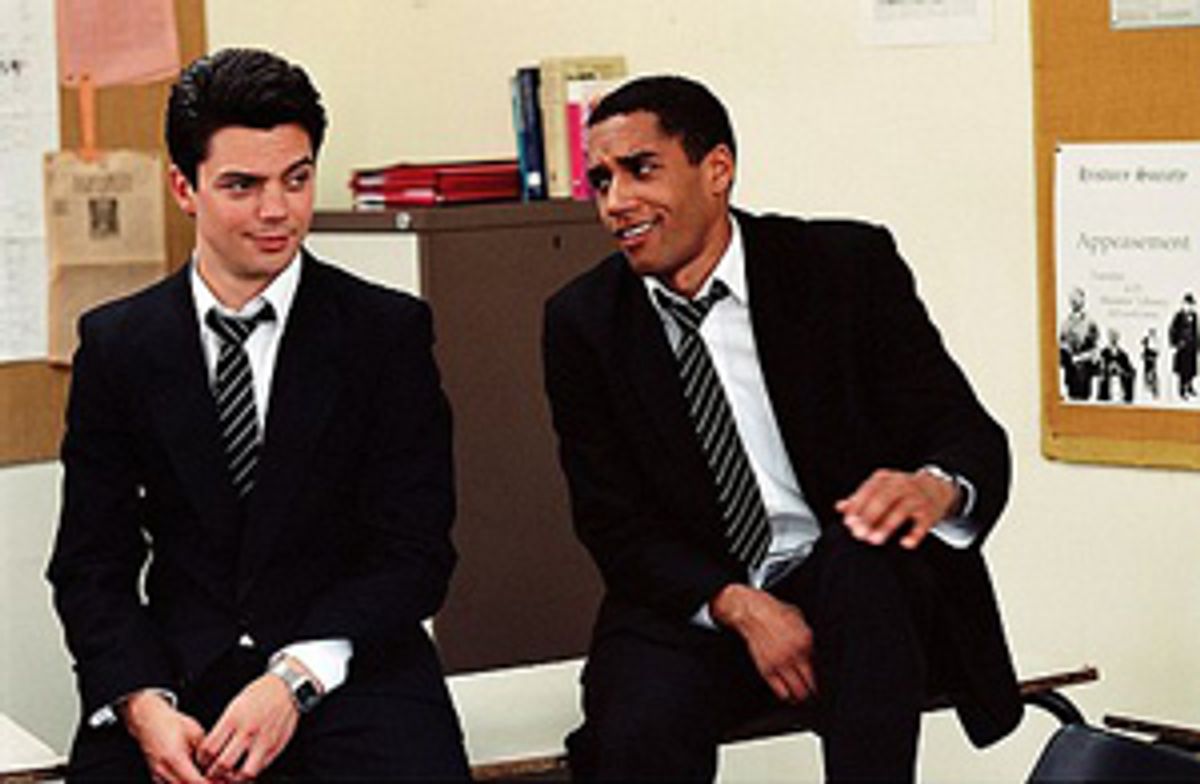Watching the film version of Alan Bennett's hit play "The History Boys," about two teachers preparing a group of rough-edged but blazingly bright northern English kids for their shot at getting into Oxford and Cambridge, is like being in the wrong place at the wrong time: The material has crackle, but its vibrancy feels far off and muted, like a fireworks display going off in a neighboring town.
That seems to have little to do with the actors -- who are reprising the roles they played in productions at London's National Theater and on Broadway -- and everything to do with the director, Nicholas Hytner. Hytner, whose other pictures include "The Madness of King George" and "The Crucible," directed "The History Boys" onstage, which means, theoretically, he's as intimately attuned to the material as anyone could be. But the picture feels static and listless, as if the brightness had been polished right out of it. The actors, particularly the younger ones, often carry themselves as if they were still onstage, as if Hytner hadn't bothered -- or didn't know how -- to tease out in them the seeming casualness you need for the movies. Lines of dialogue feel as if they'd been lugged over, brick by painstaking brick, from the stage production. Sometimes there are extra beats between those lines that must have worked beautifully onstage -- where part of an actor's job is to coax the live audience into the rhythms of the material -- but feel shellacked and overly formal on film, where the space between actor and audience is both collapsed and enlarged.
As I watched "The History Boys," I tried to envision the movie that -- with some tightening here and some loosening there -- it might have been, given how uniformly strong the performances are. The picture is set in the early 1980s in a working-class Yorkshire town, the sort of place that looks lovely if you're a tourist but inspires only restlessness and boredom if you're a kid who has grown up there. A group of young public grammar-school boys are finishing up one last semester in preparation for their university entry exams: They have a shot at getting into Cambridge and Oxford, and if they're accepted the consequences could be life changing. Obviously, this opportunity means a lot to the boys. But it means even more to their teachers, Mrs. Linton (Frances de La Tour, whose performance is a no-nonsense, deadpan delight), an old-timer whose affection for the boys is melded with protectiveness; Irwin (Stephen Campbell Moore), a very green and mildly arrogant history professor who has been brought in to give the boys a better chance at giving the admissions bigwigs whatever it is they're looking for; and Hector (Richard Griffiths), the boys' "general studies" teacher, who has inspired in them a love of Auden and "Brief Encounter" alike. He also, to his detriment, has a tendency to fall in love with his students.
The most charismatic of the boys is Dakin (Dominic Cooper), a kid whose physical beauty and sexual confidence inspire admiration and jealousy among his peers, among them Scripps (Jamie Parker), a thoughtful, affable kid who spends a lot of time in church, praying for good grades; the sweet but not terrifically ambitious Rudge (Russell Tovey), who cares more about playing football than going to university; and the sensitive, sensible Posner (Samuel Barnett), who sums up his existence in one gleaming nutshell: "I'm small, I'm Jewish, I'm homosexual, and I live in Sheffield. I'm fucked."
The material is, as you'd expect from Bennett (who began his career onstage in England in the early '60s with Peter Cook, Dudley Moore and Jonathan Miller in the revue "Beyond the Fringe"), pointed and intelligent as well as funny. More than making a statement, with a capital S, about the value of learning, Bennett questions the value of learning when it's gained only for the purpose of showing off. (Hector has a lovely speech in which he explains to his colleague Irwin that he didn't want to send his boys out into the world proclaiming their love for "wooooo-ooo-ooords"; he draws the word out with obvious contempt, a way of acknowledging that the people who are always gassing on about their love of language are often the ones who least understand its worth.)
In the movie's classroom scenes, the young actors -- particularly Barnett, who plays his character with clear-eyed good sense, never courting our pity -- are so good at sparring and parrying that they're often entertaining to watch, despite the movie's overarching problems. And the other actors do a fine, subtle job of limning the mistrust that simmers between the boys' teachers, particularly Hector (who believes in learning for its own sake) and Irwin (who's more interested in getting the boys to write flashy essays that will help them get ahead in the academic world). Griffiths, in particular, is lovely: A disheveled cherub in tweed, he deftly sidesteps sentimentality at every turn. In this disappointingly overworked and mechanical picture, he's always light on his feet.



Shares